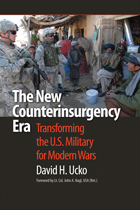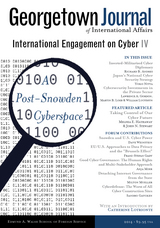5 have author last names that start with U have author last names that start with U

Confronting insurgent violence in Iraq and Afghanistan, the U.S. military has recognized the need to “re-learn” counterinsurgency. But how has the Department of Defense with its mixed efforts responded to this new strategic environment? Has it learned anything from past failures?
In The New Counterinsurgency Era, David Ucko examines DoD’s institutional obstacles and initially slow response to a changing strategic reality. Ucko also suggests how the military can better prepare for the unique challenges of modern warfare, where it is charged with everything from providing security to supporting reconstruction to establishing basic governance—all while stabilizing conquered territory and engaging with local populations. After briefly surveying the history of American counterinsurgency operations, Ucko focuses on measures the military has taken since 2001 to relearn old lessons about counterinsurgency, to improve its ability to conduct stability operations, to change the institutional bias against counterinsurgency, and to account for successes gained from the learning process.
Given the effectiveness of insurgent tactics, the frequency of operations aimed at building local capacity, and the danger of ungoverned spaces acting as havens for hostile groups, the military must acquire new skills to confront irregular threats in future wars. Ucko clearly shows that the opportunity to come to grips with counterinsurgency is matched in magnitude only by the cost of failing to do so.

What is driving political extremism in Pakistan? In early 2011, the prominent Pakistani politician Salmaan Taseer was assassinated by a member of his own security team for insulting Islam by expressing views in support of the rights of women and religious minorities. Benazir Bhutto, the former prime minister, was killed by gunfire and explosive devices as she left a campaign event in December 2007; strong evidence links members of extremist organizations to her slaying.
These murders underscore the fact that religion, politics, and policy are inextricably linked in Pakistan. In this book, Haroon K. Ullah analyzes the origins, ideologies, bases of support, and electoral successes of the largest and most influential Islamic parties in Pakistan. Based on his extensive field work in Pakistan, he develops a new typology for understanding and comparing the discourses put forth by these parties in order to assess what drives them and what separates the moderate from the extreme. A better understanding of the range of parties is critical for knowing how the US and other Western nations can engage states where Islamic political parties hold both political and moral authority.
Pakistan’s current democratic transition will hinge on how well Islamic parties contribute to civilian rule, shun violence, and mobilize support for political reform. Ullah’s political-party typology may also shed light on the politics of other majority-Muslim democracies, such as Egypt and Tunisia, where Islamist political parties have recently won elections.

The Patient Self-Determination Act of 1990 required medical facilities to provide patients with written notification of their right to refuse or consent to medical treatment. Using this Act as an important vehicle for improving the health care decisionmaking process, Lawrence P. Ulrich explains the social, legal, and ethical background to the Act by focusing on well-known cases such as those of Karen Quinlan and Nancy Cruzan, and he explores ways in which physicians and other caregivers can help patients face the complex issues in contemporary health care practices.
According to Ulrich, health care facilities often address the letter of the law in a merely perfunctory way, even though the Act integrates all the major ethical issues in health care today. Ulrich argues that well-designed conversations between clinicians and patients or their surrogates will not only assist in preserving patient dignity — which is at the heart of the Act—but will also help institutions to manage the liability issues that the Act may have introduced. He particularly emphasizes developing effective advance directives. Ulrich examines related issues, such as the negative effect of managed care on patient self-determination, and concludes with a seldom-discussed issue: the importance of being a responsible patient.
Showing how the Patient Self-Determination Act can be a linchpin of more meaningful and effective communication between patient and caregiver, this book provides concrete guidance to health care professionals, medical ethicists, and patient-rights advocates.

This fifth edition in the International Engagement on Cyber series focuses on securing critical infrastructure. The centrality of critical infrastructure in the Obama administration’s recent cybersecurity initiatives demonstrates the timeliness of this topic for greater review and scholarly input. In this manner, articles in this issue uncover the role and extent of international law and norms, public-private cooperation, as well as novel ways of conceptualizing ‘security’ in efforts to improve critical infrastructure cybersecurity. Other pieces provide case studies on the telecommunications, power, and energy sectors to generate an in-depth understanding of specific responses to security concerns in different infrastructure areas.
Additional contributions examine regulatory activities in cyberspace, the potential value of cryptocurrency, the evolution of cloud computing, cybersecurity in Brazil, as well as the integration of cyber in the military strategies of Russia, China, and the United States. The diversity of these topics demonstrates the Journal’s continued commitment to pursuing the myriad facets that compromise the field of cyber.
Please note, this special issue is not included in the subscription to the journal.

Each spring, the Cyber Project at Georgetown University’s Institute for Law, Science, and Global Security convenes a conference of leading international experts from academia, the private sector, and government to address cutting-edge issues in cybersecurity.
This issue begins with a group of articles under the theme A Post-Snowden Cyberspace, describing how Edward Snowden’s revelations directly or indirectly changed the way the global community understands cybersecurity and cyber law. Other topics covered include cyber weapons, cyber deterrence, Japan’s cybersecurity strategy, data protection in the private sector, executive accountability for data breaches, minimum security standards for connected devices, and the problem of underinvestment in cybersecurity.
Please note, this special issue is not included in the subscription to the journal.
The Georgetown Journal of International Affairs is the official publication of the Edmund A. Walsh School of Foreign Service at Georgetown University. Each issue of the journal provides readers with a diverse array of timely, peer-reviewed content penned by top policymakers, business leaders, and academic luminaries.
READERS
Browse our collection.
PUBLISHERS
See BiblioVault's publisher services.
STUDENT SERVICES
Files for college accessibility offices.
UChicago Accessibility Resources
home | accessibility | search | about | contact us
BiblioVault ® 2001 - 2024
The University of Chicago Press









